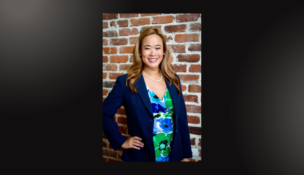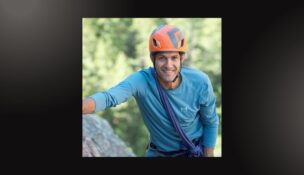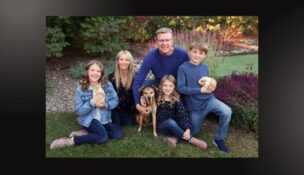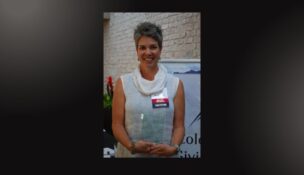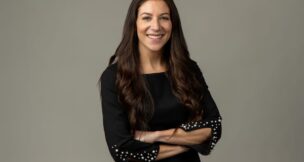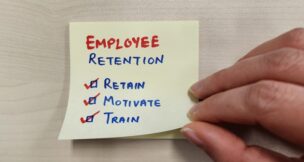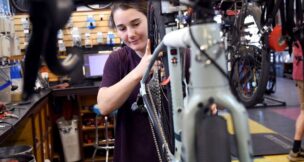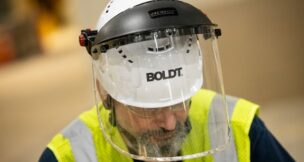Roll Mobility App Helps People with Disabilities Navigate the World
Ratings of public places driven by lived experiences.
Stephanie Wolf //June 11, 2024//

Roll Mobility co-founders Joseph Foster and Rachel Zoeller. Photo by Stephanie Wolf

Roll Mobility co-founders Joseph Foster and Rachel Zoeller. Photo by Stephanie Wolf
Roll Mobility App Helps People with Disabilities Navigate the World
Ratings of public places driven by lived experiences.
Stephanie Wolf //June 11, 2024//
Chris Layne plans ahead for everything. She says it’s necessary.
“If we’re going on vacation, we need an accessible room. We need to plan ahead and let the airlines know. If we’re going out to meet friends, I need to know before I go there, is it accessible,” says Layne, who’s been using a wheelchair for 7 ½ years after an 80-foot fall during a hike.
But lately, Layne says some of the pre-planning stress has been alleviated due to an app, of which she was an early adapter and has since become a “super user.”
Roll Mobility, founded by a couple of Coloradans, is designed as a repository of community-driven information, and more recently photos and videos, on the accessibility of restaurants, retail shops, coffee shops, parking lots, any place meant to be open to the public.
The idea is that those with lived experience drive ratings on the app and, therefore, help others with disabilities have the information they need to enter a business with less uncertainty and anxiety. And the app has a global presence, with about 16,000 places viewed across more than 40 countries as of late April.
READ: CEO of arc Thrift Stores, Lloyd Lewis, Sees an ‘Hidden Crisis’ of Disability Rights
“When we know a place is not accessible, we choose not to go, which limits our social life,” Layne says.
The app launched in February 2023, but its origin story dates back to winter of 2020.
Roll Mobility co-founder Joseph Foster was volunteering with athletes participating in an adaptive sporting event in Breckenridge called The Hartford Ski Spectacular. Foster wanted to take a group out to dinner, so he called around and thought he had found an accessible restaurant.
“What we found instead was there was a giant step to get inside [the bathroom], and it was all a bit of a mess,” Foster says. “So I asked these guys, ‘This doesn’t happen to you at home. This only happens in small town, right?’”
The athletes’ response? They laughed, says Foster — this happened everywhere. Foster thought: “There’s got to be a better way to hold all this information … and keep that knowledge in a place where people could easily access it.”
Foster had a friend with experience developing apps. And after a few early sketches on bar napkins, Foster says it became clear that an app was an easy and portable solution.
When Foster brought the idea to Rachel Zoeller, they were all about it.
“That’s something I was already encountering as a wheelchair user, just how exhausting it is to be disabled and navigate this world,” says Zoeller, a Roll Mobility co-founder. “It’s not as simple as a quick Google search. Maybe Google or Yelp has it listed as wheelchair accessible, but what does that mean? Who said that?”
Zoeller and Foster knew, early on, they wanted the disability community to steer the Roll Mobility ship, which is why they sought feedback from people with disabilities as they built it and why they wanted the information to be user-generated. Businesses receive color-coded ratings, from a not-so-accessible red to yellow and then the gold-star rating of green, based on how users answered the app’s series of questions about the physical space. Questions aren’t based on the Americans with Disabilities Act, which Zoeller calls “the bare minimum.”
“Full accessibility, it starts at the door,” Zoeller says, then listing off some of the questions. “Can you get in easily? Is there an automated door opener? Is there enough space to move around? Are there plenty of low-top tables with removable chairs?” Then there are questions dedicated to the bathroom: Does the door push away; can a power chair fit in the stall?
Foster clarifies they’re not “the ADA police” nor Yelp, notoriously a place where people post complaints: “We’re not here to bash people. … We are trying to provide information so that people can really find these businesses that are gold that make them feel comfortable and welcome.”
READ: 5 Ways to Embrace Universal Design in Your Communication Department
“Nobody knows what’s accessible or not accessible like those of us that live with this disability or family members that interact with us,” former Democratic State Rep. David Ortiz says . “That’s what’s so amazing about this app, it puts the power back in our hands.”
Ortiz, Colorado’s first lawmaker to use a wheelchair and who introduced a bill to create the State Disability Opportunity Office, learned of the app, in part, due to Zoeller’s advocacy and visibility in the community, including at the State Capitol. He hopes Roll Mobility can also serve as a tool for businesses. “If a business also wants to download the app and see what it’s about, they will learn the criteria by which they get rated and maybe start planning and budgeting for making things better,” Ortiz says.
Lady Justice Brewing in Englewood plans to make updates based on in-person Roll Mobility feedback, including lowering part of the bartop, adding push buttons for the front door, and improving the paint and spacing for the accessible parking spots.
“It’s really helpful to have folks who are on your side letting you know how you can better your business,” says Alison Wisneski, the brewery’s director of marketing and sales. “Why wouldn’t you want to know what can make your space best for all who enter?”
As for Roll Mobility’s future forecast, co-founder and head of marketing Laura Sporrer said the app has been “self-funded” since its inception. Everyone has put in money and sweat equity to get it off the ground and running. But she and her colleagues would like to grow the team and the app’s reach. To that end, they’re currently looking for investors and grants. They are not exploring selling the app to a bigger company, at least not presently.
“We currently don’t have an exit strategy or plan [to sell],” Sporrer said. “We are focused on meeting the needs of the community above all else. I’d never say never, but that’s not where our heads are right now.”
That’s certainly where Zoeller’s thoughts are at the moment. They would also like to expand the app beyond mobility issues and add questions that would help people with invisible disabilities.
“Already people are asking is there a way to denote sensory information? Whatever the community brings forward, I hope we can accommodate,” Zoeller says.
Foster agrees. “For me, success means giving it away to the community, where the community drives any new initiative and really own it. So success is kind of like watching it fly away.”
t





